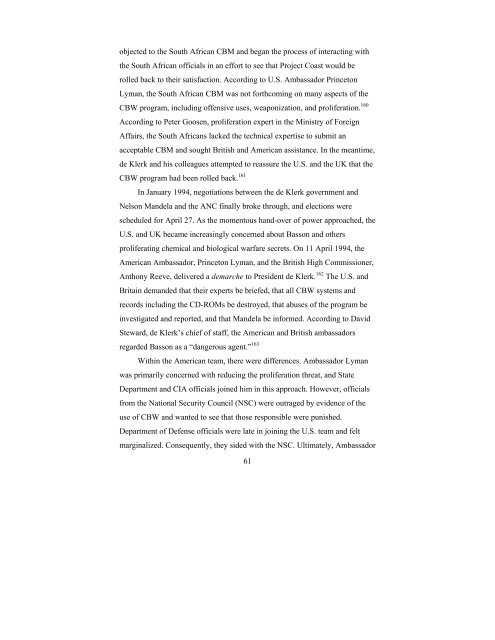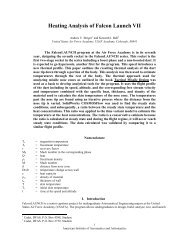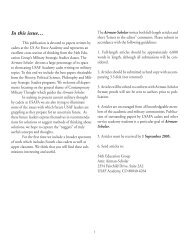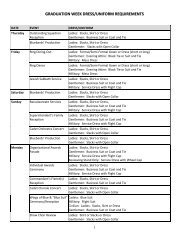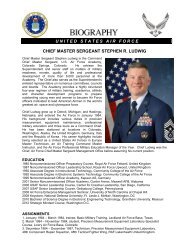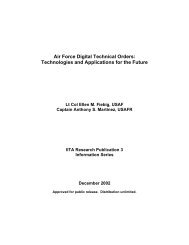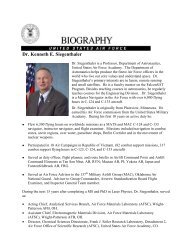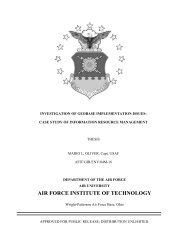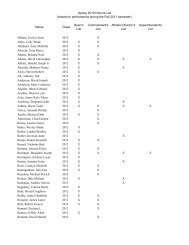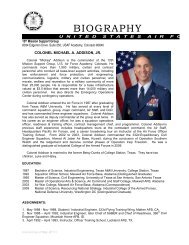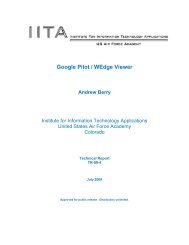the rollback of south africa's biological warfare program
the rollback of south africa's biological warfare program
the rollback of south africa's biological warfare program
You also want an ePaper? Increase the reach of your titles
YUMPU automatically turns print PDFs into web optimized ePapers that Google loves.
objected to <strong>the</strong> South African CBM and began <strong>the</strong> process <strong>of</strong> interacting with<br />
<strong>the</strong> South African <strong>of</strong>ficials in an effort to see that Project Coast would be<br />
rolled back to <strong>the</strong>ir satisfaction. According to U.S. Ambassador Princeton<br />
Lyman, <strong>the</strong> South African CBM was not forthcoming on many aspects <strong>of</strong> <strong>the</strong><br />
CBW <strong>program</strong>, including <strong>of</strong>fensive uses, weaponization, and proliferation. 160<br />
According to Peter Goosen, proliferation expert in <strong>the</strong> Ministry <strong>of</strong> Foreign<br />
Affairs, <strong>the</strong> South Africans lacked <strong>the</strong> technical expertise to submit an<br />
acceptable CBM and sought British and American assistance. In <strong>the</strong> meantime,<br />
de Klerk and his colleagues attempted to reassure <strong>the</strong> U.S. and <strong>the</strong> UK that <strong>the</strong><br />
CBW <strong>program</strong> had been rolled back. 161<br />
In January 1994, negotiations between <strong>the</strong> de Klerk government and<br />
Nelson Mandela and <strong>the</strong> ANC finally broke through, and elections were<br />
scheduled for April 27. As <strong>the</strong> momentous hand-over <strong>of</strong> power approached, <strong>the</strong><br />
U.S. and UK became increasingly concerned about Basson and o<strong>the</strong>rs<br />
proliferating chemical and <strong>biological</strong> <strong>warfare</strong> secrets. On 11 April 1994, <strong>the</strong><br />
American Ambassador, Princeton Lyman, and <strong>the</strong> British High Commissioner,<br />
Anthony Reeve, delivered a demarche to President de Klerk. 162 The U.S. and<br />
Britain demanded that <strong>the</strong>ir experts be briefed, that all CBW systems and<br />
records including <strong>the</strong> CD-ROMs be destroyed, that abuses <strong>of</strong> <strong>the</strong> <strong>program</strong> be<br />
investigated and reported, and that Mandela be informed. According to David<br />
Steward, de Klerk’s chief <strong>of</strong> staff, <strong>the</strong> American and British ambassadors<br />
regarded Basson as a “dangerous agent.” 163<br />
Within <strong>the</strong> American team, <strong>the</strong>re were differences. Ambassador Lyman<br />
was primarily concerned with reducing <strong>the</strong> proliferation threat, and State<br />
Department and CIA <strong>of</strong>ficials joined him in this approach. However, <strong>of</strong>ficials<br />
from <strong>the</strong> National Security Council (NSC) were outraged by evidence <strong>of</strong> <strong>the</strong><br />
use <strong>of</strong> CBW and wanted to see that those responsible were punished.<br />
Department <strong>of</strong> Defense <strong>of</strong>ficials were late in joining <strong>the</strong> U.S. team and felt<br />
marginalized. Consequently, <strong>the</strong>y sided with <strong>the</strong> NSC. Ultimately, Ambassador<br />
61


